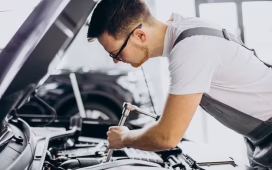Your vehicle’s muffler is a key component of the exhaust system. It serves primarily to reduce engine noise, but it also plays an essential role in helping to control emissions. The muffler works by directing exhaust gases through a series of chambers and baffles that dampen sound before the gases are released into the atmosphere. A well-functioning muffler ensures your vehicle runs smoothly, quietly, and efficiently.
How Rust Forms on the Muffler
Rust, or corrosion, is one of the biggest threats to the longevity of a muffler. The exhaust system, including the muffler, is constantly exposed to harsh conditions. Hot exhaust gases and moisture from rain, snow, and even humidity create an environment where rust can form. Additionally, road salts, especially in colder climates, exacerbate this process by accelerating corrosion. Rust can develop both on the exterior of the muffler as well as inside the components, leading to weak spots, holes, and other damage that interfere with the muffler’s ability to function properly.
The Impact of Rust on Muffler Performance
When rust begins to take hold inside the muffler, it doesn’t just affect the appearance of your exhaust system; it can significantly reduce its effectiveness. One of the most noticeable impacts of muffler rust is an increase in noise. The muffler’s ability to absorb and dampen sound diminishes as the corrosion weakens internal parts, leading to a louder and less comfortable ride. Rust also causes cracks or holes in the muffler, which can allow exhaust gases to leak. These leaks lead to an inefficient exhaust system, increasing the strain on the engine and potentially causing harmful emissions to escape into the cabin, which can be dangerous.
How Rust Affects Fuel Efficiency
A muffler compromised by rust doesn’t just make your car louder, it can also affect fuel efficiency. When the muffler begins to rust, it can create small holes or cracks that allow exhaust gases to escape prematurely. This can increase backpressure in the exhaust system, making it harder for the engine to expel gases efficiently. As a result, the engine has to work harder to maintain performance, leading to higher fuel consumption. In addition, rusted mufflers may prevent your vehicle from passing emissions tests, which can lead to further repair costs and potential fines. This is why choosing the Auto Repair in Houston, TX based service beforehand is essential.
Prevention and Maintenance to Combat Muffler Rust
While rust is an inevitable part of a vehicle’s lifespan, regular maintenance can help prevent excessive damage to your muffler. Ensuring that your vehicle is inspected regularly, especially after harsh weather conditions, can help identify early signs of corrosion. If you live in an area with a lot of rain or snow, washing your car frequently—especially the undercarriage—can help remove harmful salt and debris that accelerate rust formation. If rust is already present, addressing it quickly by replacing damaged sections of the muffler or the entire muffler itself can prevent further damage to the exhaust system and maintain optimal vehicle performance.












